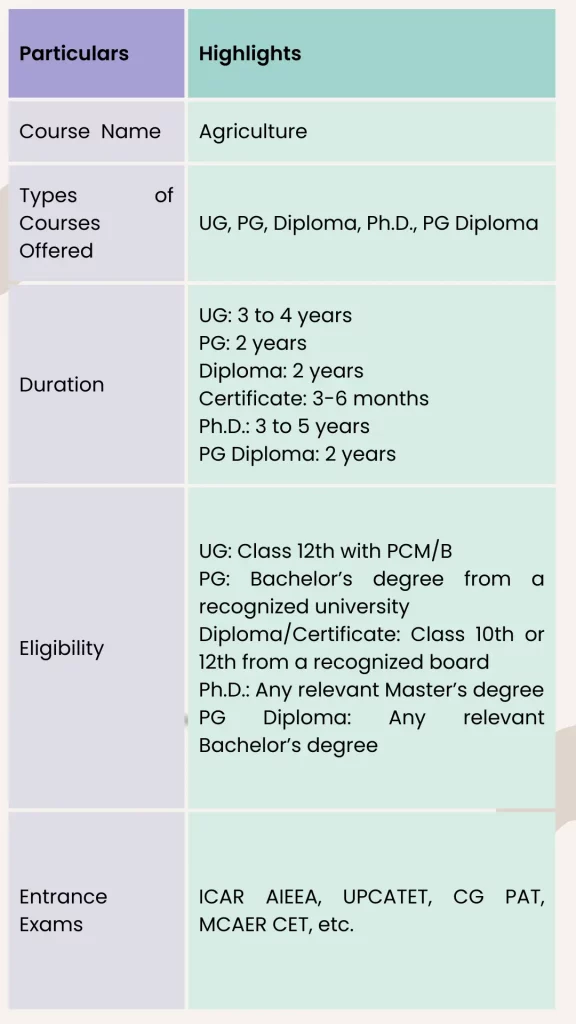Are you the one who want to establish your career in journalism industry? Do you want to explore agriculture courses after 12th? Then this post is for you!
The agricultural sector is the basis of our economy, which provides us not only with food, but also with various raw materials. With the modern development of technology and innovation in the industry, the scope of careers in agriculture has grown tremendously.
No wonder, building a career in agriculture requires a deep understanding of scientific principles and many other technical and business topics. Don’t worry we are here to help you!
Topics covered
Overview of agriculture
Agriculture is a scientific discipline that involves the study of various scientific, technical and business subjects related to agriculture, horticulture, farm management, poultry, dairy, agricultural biotechnology, etc. recent times with cutting-edge research and continuous innovation in the industry.
👉 Explore the Best Courses After 12th for a Stable Future
Agriculture course details
Following are the highlights of agriculture courses:

Get the Detailed Information about other professional courses after 12th
List of agriculture courses after 12th science
Some of the undergraduate courses after 12th science with PCM or PCB are:
- B.Sc. in
- Agriculture
- Horticulture
- Plant Pathology
- Food Science
- Dairy Science
- Plant Science
- Agricultural Biotechnology
- Fisheries Science
- Forestry
- B.E. or B. Tech in
- Agricultural and Food Engineering
- Agricultural Information Technology
- Agricultural Engineering
- Agricultural Engineering
- Dairy Technology
- Agriculture and Dairy Technology
Some of diploma courses after 12th science are:
- Diploma in
- Agriculture
- Horticulture
- Food Processing
- Dairy Technology
- Food Processing
Following are the certification agriculture courses after 12th science:
- Certification course in
- Organic farming
- Dairy and Agricultural
- Horticulture
- Food production
Popular agriculture courses after 12th arts
Here are some of the popular agriculture courses after 12th arts:
- BBA in Agriculture Management
- BSc in
- Agricultural Biotechnology
- Agriculture
- Agriculture and Food Science
- Dairy Science
- Fisheries
- Forestry
- Horticulture Science
- BTech in
- Agricultural and Food Engineering
- Agricultural Engineering
- Agricultural Information Technology
- Dairy Technology
- Diploma in
- Agriculture
- Animal Husbandry
- Horticulture
- Certificate in Food Production
- Certificate Course in Food and Beverage Services

BSc agriculture courses after 12th – Highlights
Following is the highlights about BSc agriculture courses after 12th:
| Particulars | Highlights |
| Name of the Course | BSc Agriculture |
| Type of the Course | Undergraduate |
| Eligibility | Class 12th with Physics, Chemistry, Mathematics or Biology/Arts |
| Duration of the Course | 3 to 4 years |
| Popular Subjects | Agronomy, Agriculture, Plant Biochemistry, Water Management, Agricultural Meteorology, Organic Farming, Entomology, Horticulture, Genetics, Food Technology, Farming System, Plant Breeding, etc. |
| Entrance Exams | BHU UET (Banaras Hindu University); AP EAMCET (Andhra Pradesh); SAAT (Siksha Anusandhan); CG PAT (Chhattisgarh); OUAT (Orissa University of Agriculture and Technology) |
| Popular Colleges | Chandigarh University, Chandigarh; Govind Ballabh Pant University Of Agriculture and Technology, Pantnagar; Bharath University, Chennai; Annamalai University, Chidambaram; Orissa University Of Agriculture and Technology, Bhubaneswar, etc. |
| Average Fees | Rs. 20,000 – Rs. 1,50,000 |
| Job Roles | Agriculturalist, Agricultural Research Scientist, Agriculture Development Officer, Assistant Plantation Manager, Agriculture Technician |
Are there any agriculture courses after 12th commerce?
No, you cannot apply for agriculture courses because the eligibility criteria state that the student must have passed 10+2 or equivalent examination in Biology or Mathematics, chemistry, and Physics from any recognized school or college. So only science students can apply and hence no commerce student can pursue it.
Conclusion
Finally, you have all the information optimized just for your use. And you have an answer on agriculture courses after 12th? If you still feel indecisive or confused, do dial us up. It is often useful to reach out to expert counselors for addressing individual issues. iDreamCareer experts are always ready to help young minds like you from 9th class, 10th class, class 11, class 12 with an aim to select your most-suited career choices.
Useful Links:
- Career in Non-Medical Subjects
- Best Branches in Engineering
- Agriculture Courses: The Ultimate Master Guide
- Agriculture Course After 10th
- What are After BSc Courses
- How to Become a Plant Scientist
- How to Establish a Career as an Agronomist
- Career as an Agriculture Scientist
FAQs
Studying agriculture is an easy and interesting course. Duration for the course vary by university. You will study a maximum of 12 subjects in each semester. There will be practical and theoretical sessions for most of the subjects, except some of the related subjects.
No, NEET is not necessary for pursuing agriculture.
The duration of agriculture course after 12th is 3 to 4 years.

Anushree Rastogi is a Senior Content Writer at iDreamCareer, bringing over 5 years of expertise to the field of career counseling. She has done a PGDM in Marketing and Finance and possesses a unique blend of skills that allows her to craft engaging and informative content. She is passionate about helping individuals navigate their career paths and has dedicated her career to providing valuable insights through her content. Her commitment to excellence and keen understanding of the career landscape make her a trusted guide for those seeking professional direction. With a flair for clear and engaging writing, Anushree is on a mission to empower others to make informed and fulfilling career choices.



















That was really a great Article. Thanks for sharing information. Wish to see much more like this.
Thank you for providing valuable content